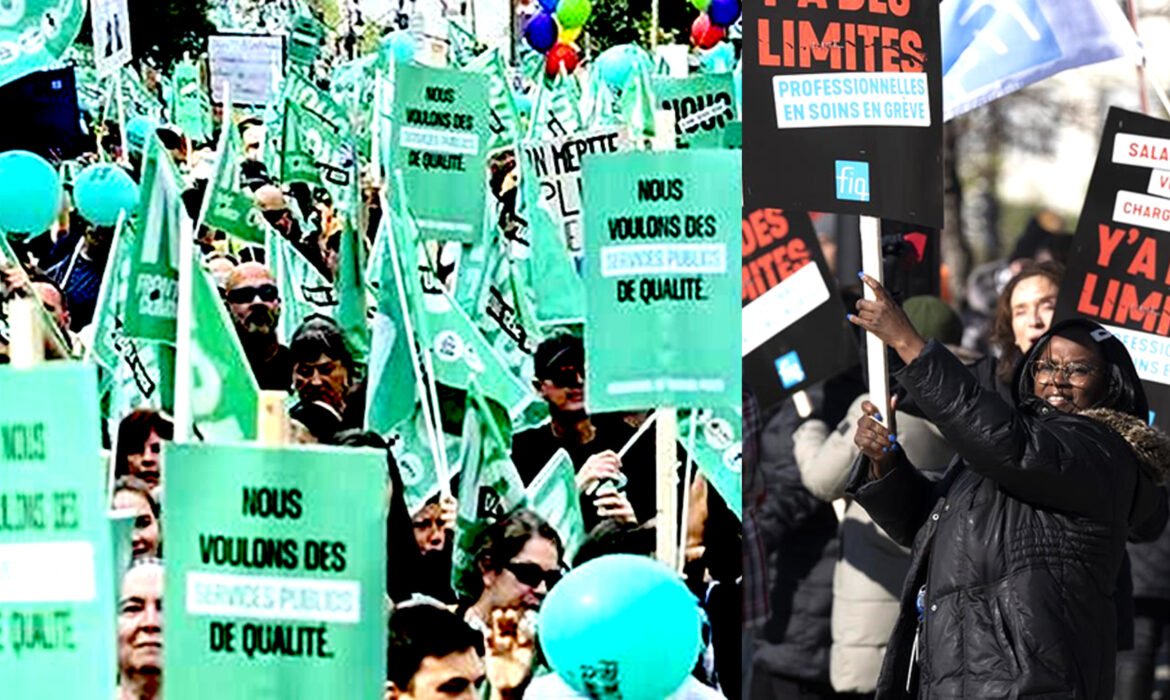Quebec is bracing for a significant escalation in labor strikes as public sector workers, deeply frustrated with the provincial government’s handling of wage and working conditions, are preparing for a week-long strike in December. This action, announced by a coalition of public sector unions known as the Common Front, represents a critical juncture in a series of industrial actions gripping the province.
The Common Front, comprising 420,000 health, social services, and education workers, has declared that the December 8-14 strike will be their final move before potentially launching an unlimited general strike. This decision underscores public sector employees’ growing impatience and dissatisfaction with the Quebec government’s policies and negotiations.
Jacintha Duplan, a daycare technician at Coronation School, and Andrea Di Tomaso, a representative of the FEESP-CSN School Sector Negotiating Committee, echo the sentiments of many educators in the province. They highlight teachers’ challenges, including low salaries, inadequate support for students with special needs, and the struggle for more working hours and better overall working conditions.
“So part of the reason why we’re on strike is because. The Common Front workers which are The CSQ, the FTQ, the AP, TS and the CSN, are fed up because since COVID, we have not had a chance to get any pay increase despite being promised that for many years. Everything has been on hold. And we decided that enough is enough.” Di Tomaso explains.
“We would like more working hours, overtime, professional improvement and training, health and safety, violence, mental health, and staffing. Ten years status of employment, temporary to regular and general working conditions in the classrooms. Right now, the teachers are overloaded with more students with special needs and we do not have enough special attendants in the classroom to help assist.”
Jacintha also expresses her frustration, “the average salary is under $25,000 per year; in my institution, there is only one person, which is myself working 35 hours. All the other educators are looking for more hours but can’t get them because it’s considered a school enrichment program. Like the pre-kindergarten program, we don’t do anymore, and this is one of those programs that gave the educators a few extra hours because the hours were maintained within the school system. Now we don’t have the program anymore and the government hasn’t implemented where the educators can go.”
The problem with this is that public sector workers such as teachers are forced to go and get food from food banks due to fewer working hours and insufficient money to support themselves.
“We put out a survey, and many of the respondents, over 7,000, said they have gone to a food bank in the last year.” Andrea laments.
The healthcare sector is equally strained. Juleen Barrington, a healthcare worker, expresses her frustration over unfulfilled government promises to increase staffing, especially in long-term care facilities. Despite acknowledging the need, the government’s failure to allocate sufficient funds for additional staff has led to critical understaffing. The situation worsened after the pandemic when foreign nurses and doctors, crucial during the crisis, left due to stringent language requirements.
“Adding fuel to the fire,” Barrington exclaims, “the government gave themselves a 30% pay increase, and they’re refusing to give anyone else a pay increase. They know that inflation is up and everything is expensive. On top of that, to add insult to injury, they bought a hockey team to bring to Quebec. That just does not sit well with anyone. The issue we’re having is how they act. They say one thing on TV and don’t do what they say. They told us that they will increase the staff in the institutions, especially the long-term care facilities. They have not done that! They’ve sent people to get trained, but when they come to the institution, they cannot keep the person because the institution states that the government has not given them the money to pay the staff.”
“In the institution where I work, 33 patients or residents are on a floor. And only one licensed practical nurse (LPN) gives the medication to these people. One LPN is not enough. For example, if she’s in room 48 and somebody in room 10 needs something, it’s hard for her to leave that side of the hallway to come down to the other side. We need extra people on the units.”
Both sectors are united in their willingness to hold out for their demands to be met, signaling the December strike as a precursor to more intensive actions if necessary. The FIQ (Fédération Interprofessionnelle de la santé du Québec), representing 80,000 nurses and other health professionals, has also expressed its determination. Having unanimously rejected a contract offer a month ago, the FIQ emphasizes the need for continued mobilization to ensure the government addresses their demands.
This impending strike is a critical juncture in Quebec’s labor landscape. It highlights the mounting frustration among public sector workers who feel marginalized and undervalued. With the December strike on the horizon, Quebec is poised for the impact of this substantial labor movement, and the possibility of an unlimited general strike looms ever closer.
















